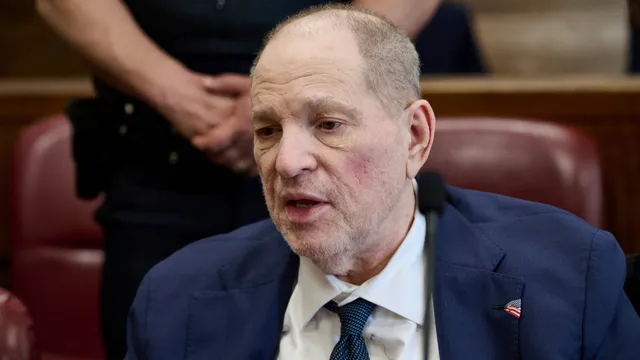
Harvey Weinstein found guilty of criminal sexual act at retrial
2025-06-12 06:04- The jury convicted Harvey Weinstein of a first-degree criminal sexual act against Miriam Haley while acquitting him of another count and remaining undecided on a rape charge involving Jessica Mann.
- The retrial followed the overturning of Weinstein's previous conviction and the lifting of a significant burden on his behalf by legal teams, who argued for a fairer consideration of the case.
- This verdict plays into larger discussions of accountability for sexual misconduct, revitalizing discourse around the allegations against Weinstein and their relation to the #MeToo movement.
Express your sentiment!
Insights
In New York, Harvey Weinstein has been found guilty of a first-degree criminal sexual act as part of his retrial, more than a year after his previous conviction was overturned by the state Supreme Court. The retrial unspooled significant details, including allegations from two women, Jessica Mann and Miriam Haley, with the jury also considering a third count of third-degree rape related to Mann. The partial verdict was reached after days of deliberation, and while Weinstein was acquitted of charges involving another accuser, Kaja Sokola, the jury determined he had committed a criminal sexual act against Haley. Legal representatives for Weinstein maintained that all interactions were consensual, positioning him as a falsely accused figure in the #MeToo context. Meanwhile, the prosecution underscored the gravity of the acts represented, invoking the broader societal implications underscored by the accusations against him. This trial follows an earlier, high-profile case resulting in a 23-year prison sentence for Weinstein in 2020, which was invalidated on appeal due to identified trial irregularities. Prosecutors have stated that they will pursue appropriate sentencing following this retrial verdict, amidst Weinstein's ongoing health concerns while incarcerated at Rikers Island.
Contexts
The #MeToo movement has had a profound impact on Hollywood, reshaping the landscape of the entertainment industry in the wake of numerous allegations of sexual harassment and assault. Launched in late 2017, the movement encouraged individuals to come forward with their experiences, highlighting the systemic abuse that had long been prevalent behind the scenes. High-profile cases, including those of film mogul Harvey Weinstein and other prominent figures, revealed a pervasive culture of silence and complicity, which empowered more people to speak out. This unprecedented wave of accusations not only led to legal consequences for many offenders but also fostered a broader discussion about gender equality and the treatment of women in the workplace across the industry. In direct response to the #MeToo movement, Hollywood has undertaken various initiatives aimed at promoting safer work environments and greater accountability. Many studios and production companies have implemented new policies regarding sexual harassment, mandating training programs and clear reporting procedures. Organizations such as Time's Up have emerged, providing legal and financial support to individuals facing workplace misconduct, furthering the commitment to protect and empower those affected. This shift in policy and discourse has led to an increase in female representation in key decision-making roles, including directing and producing, as industry leaders recognize that diverse perspectives are crucial to creating environments that prioritize equity and respect. The cultural ramifications of the #MeToo movement extend beyond immediate policy changes; it has catalyzed a larger dialogue about power dynamics in Hollywood and the need for transformative change. The movement has helped to bring to light the disparities faced by women and marginalized groups in the industry, prompting many to advocate for inclusive practices and supportive networks. These efforts aim to break down barriers that have historically enabled abusive behavior, allowing more equitable access to opportunities within the industry. As the conversation progresses, there is a growing recognition of the importance of intersectionality, with advocates seeking to ensure that all voices are heard and represented. Looking forward, the legacy of the #MeToo movement in Hollywood will likely influence the industry for years to come. As more individuals feel empowered to report misconduct without fear of retaliation, it is expected that this accountability will lead to a cultural shift that prioritizes the safety and well-being of all industry professionals. The heightened awareness and activism surrounding these issues suggest a more promising future for Hollywood, where equity and respect can thrive alongside creativity and talent. While challenges remain, the push for continued change reflects a commitment to transforming the industry landscape into one that is more inclusive and just.